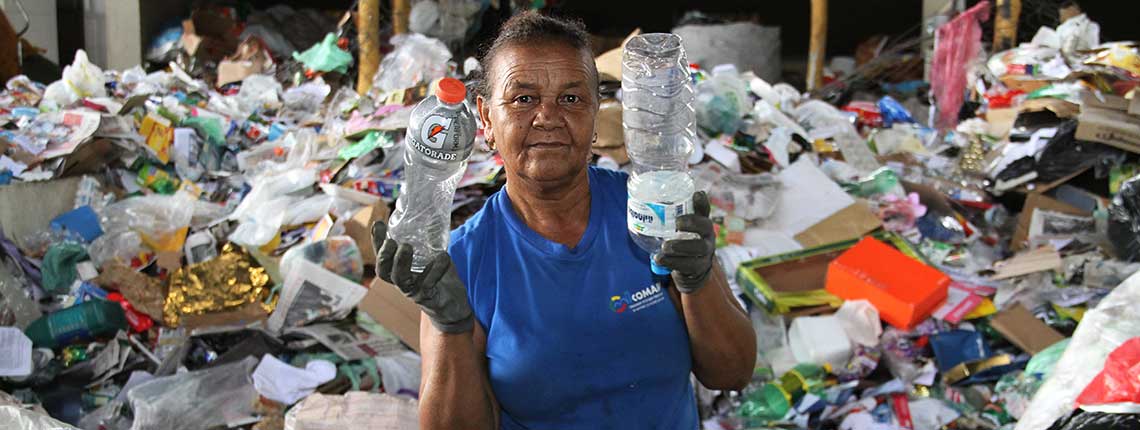'Cooperative… Honesty! Cooperative… Power! Cooperative… Progress!’
This rallying cry adopted by cooperatives in Nigeria’s Lagos State has many stories attached to it. Some are told in podcasts where talking to people helps to throw light on what cooperatives are doing well and what can be done to overcome their challenges.
In June 2022, a delegation of workers representing the Global Alliance of Waste Pickers, the International Domestic Workers Federation (IDWF), HomeNet International, Self-Employed Women's Association of India (SEWA), StreetNet International, and WIEGO took part in the general discussion at the 110th International Labour Conference on Decent Work and the Social and Solidarity Economy (SSE). In a position paper, the delegation noted the importance of building on the foundation of international instruments on cooperatives and said the ILO Office should strengthen the partnership with representative organizations of workers in the informal economy, including SSE units, to optimize the lessons from the experience of cooperatives appropriately.
The draft conclusions encourage member states to “explicitly recognize the social and solidarity economy (SSE) as a relevant means of achieving sustainable development, social justice, decent work, productive employment and improved living standards for all.” Examples of ways that informal workers are using cooperatives to achieve this are:
Nigeria's Informal Workers Access Insurance Through Cooperative
The Federation of Informal Workers’ Organizations of Nigeria (FIWON) cooperative is a wholly informal-worker-driven collective that facilitates access to insurance for its members. It has chapters in the Nigerian cities of Lagos and Osun. Start small, start early and start alone are among the lessons learned from the FIWON case study documented in the report. FIWON executives have come to terms with self-organizing as the route to advancing economic empowerment and social protection for informal workers. Inspired by examples such as SEWA in India, the cooperative aims to get enough donor support to enable it to grow its membership, and then to establish its own organizations that will provide social insurance directly to its members. The case study findings could be useful to others in contexts where public trust has been significantly eroded and government investment in social protection is low.
Indian Cooperative Responds to Need for Full-Day Child Care
Responding to women informal workers’ pressing need for full-day child care in Ahmedabad, India, the Self Employed Women’s Association (SEWA) set up a child-care cooperative called Sangini. The 11 centres that the cooperative runs for SEWA members provide full-time care for children up to the age of 6. The child-care workers called balsevikas come from the same community as the children and the women informal workers. The cooperative structure and community-based orientation of the child-care services ensure that the balsevikas are embedded in their communities, which helped enormously in 2020 and 2021 during the pandemic. The main objectives of the Sangini cooperative are to enhance women informal workers’ economic empowerment, self-reliance and working conditions through access to full-day child care, and to improve child development services through an integrated approach focused on nutrition, health care and education.
Cooperatives in Brazil Act as a Cushion for Waste Pickers
Cooperatives in Brazil enabled waste pickers (catadores) to access support during the COVID-19 pandemic. In this way, they acted as a cushion against the worst effects of the economic crisis through their participation in support schemes such as the reverse logistics system. In Brazil, the negative impact of the pandemic is compounded by widespread chaos caused by the dismantling of public health networks and various social policies. WIEGO surveys found that it was through cooperatives that COVID-19 protocols were able to be quickly implemented in the sorting sheds used by catadores. Not only did this reduce the health risks for cooperative members, but it also increased their credibility with public officers.
UTEP Gives Voice to Excluded Workers in Argentina
In Argentina, the Excluded Workers Movement (Movimiento de Trabajadores Excluidos, MTE) where people who have been squeezed out of the formal labour market come together, has given rise to the Popular Economy Workers’ Trade Union (Unión de Trabajadores de la Economía Popular, UTEP). The movement started two decades ago during a financial crisis that left 21 per cent of the labour force unemployed. One of the biggest impacts of the crisis was the rapid rise in the number of people looking through waste in the hope of finding recyclable materials to trade with. Working conditions for waste pickers were abysmal, with no social protections. The first group in the MTE was created in that context and, based on waste pickers’ experiences, the movement expanded to reach informal workers in other sectors. Following a process of waste-picker cooperatives in the capital, Buenos Aires having discussions with state agencies, private companies and non-governmental organizations – and making their demands known – cooperatives play an active role in the management of solid waste.
